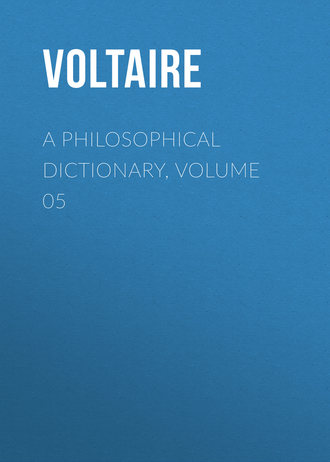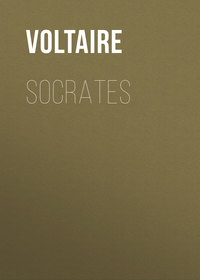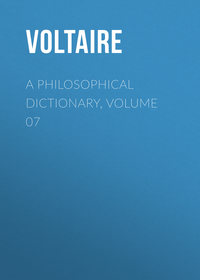
A Philosophical Dictionary, Volume 05
Bills of confession were at that time much in fashion. The sick man sent for his parish priest, who was a simple and sottish man, and threatened to have him hanged by the parliament of Bordeaux if he did not instantly administer the viaticum to him. The priest was alarmed, and accordingly celebrated the sacred ordinance, as desired by the patient; who, after the ceremony, declared aloud, before witnesses, that the Biscayan pastor had falsely accused him before the king of being tainted with the Mussulman religion; that he was a sincere Christian, and that the Biscayan was a calumniator. He signed this, after it had been written down, in presence of a notary, and every form required by law was complied with. He soon after became better, and rest and a good conscience speedily completed his recovery.
The Biscayan, quite exasperated that the old patient should have thus exposed and disappointed him, resolved to have his revenge, and thus he set about it.
He procured, fifteen days after the event just mentioned, the fabrication, in his own language or patois, of a profession of faith which the priest pretended to have heard and received. It was signed by the priest and three or four peasants, who had not been present at the ceremony; and the forged instrument was then passed through the necessary and solemn form of verification and registry, as if this form could give it authenticity.
An instrument not signed by the party alone interested, signed by persons unknown, fifteen days after the event, an instrument disavowed by the real and credible witnesses of that event, involved evidently the crime of forgery; and, as the subject of the forgery was a matter of faith, the crime clearly rendered both the priest and the witnesses liable to the galleys in this world, and to hell in the other.
Our lord of the manor, however, who loved a joke, but had no gall or malice in his heart, took compassion both upon the bodies and souls of these conspirators. He declined delivering them over to human justice, and contented himself with giving them up to ridicule. But he declared that after the death of the Biscayan he would, if he survived, have the pleasure of printing an account of all his proceedings and manœuvres on this business, together with the documents and evidences, just to amuse the small number of readers who might like anecdotes of that description; and not, as is often pompously announced, with a view to the instruction of the universe. There are so many authors who address themselves to the universe, who really imagine they attract, and perhaps absorb, the attention of the universe, that he conceived he might not have a dozen readers out of the whole who would attend for a moment to himself. But let us return to fanaticism.
It is this rage for making proselytes, this intensely mad desire which men feel to bring others over to partake of their own peculiar cup or communion, that induced the Jesuit Châtel and the Jesuit Routh to rush with eagerness to the deathbed of the celebrated Montesquieu. These two devoted zealots desired nothing better than to be able to boast that they had persuaded him of the merits of contrition and of sufficing grace. We wrought his conversion, they said. He was, in the main, a worthy soul: he was much attached to the society of Jesus. We had some little difficulty in inducing him to admit certain fundamental truths; but as in these circumstances, in the crisis of life and death, the mind is always most clear and acute, we soon convinced him.
This fanatical eagerness for converting men is so ardent, that the most debauched monk in his convent would even quit his mistress, and walk to the very extremity of the city, for the sake of making a single convert.
We have all seen Father Poisson, a Cordelier of Paris, who impoverished his convent to pay his mistresses, and who was imprisoned in consequence of the depravity of his manners. He was one of the most popular preachers at Paris, and one of the most determined and zealous of converters.
Such also was the celebrated preacher Fantin, at Versailles. The list might be easily enlarged; but it is unnecessary, if not also dangerous, to expose the freaks and freedoms of constituted authorities. You know what happened to Ham for having revealed his father's shame. He became as black as a coal.
Let us merely pray to God, whether rising or lying down, that he would deliver us from fanatics, as the pilgrims of Mecca pray that they may meet with no sour faces on the road.
SECTION IVLudlow, who was rather an enthusiast for liberty than a fanatic in religion – that brave man, who hated Cromwell more than he did Charles I., relates that the parliamentary forces were always defeated by the royal army in the beginning of the civil war; just as the regiment of porters (portes-cochères) were unable to stand the shock of conflict, in the time of the Fronde against the great Condé. Cromwell said to General Fairfax: "How can you possibly expect a rabble of London porters and apprentices to resist a nobility urged on by the principle, or rather the phantom, of honor? Let us actuate them by a more powerful phantom – fanaticism! Our enemies are fighting only for their king; let us persuade our troops they are fighting for their God.
"Give me a commission, and I will raise a regiment of brother murderers, whom I will pledge myself soon to make invincible fanatics!"
He was as good as his word; he composed his regiment of red-coated brothers, of gloomy religionists, whom he made obedient tigers. Mahomet himself was never better served by soldiers.
But in order to inspire this fanaticism, you must be seconded and supported by the spirit of the times. A French parliament at the present day would attempt in vain to raise a regiment of such porters as we have mentioned; it could, with all its efforts, merely rouse into frenzy a few women of the fish-market.
Only the ablest men have the power to make and to guide fanatics. It is not, however, sufficient to possess the profoundest dissimulation and the most determined intrepidity; everything depends, after these previous requisites are secured, on coming into the world at a proper time.
SECTION VGeometry then, it seems, is not always connected with clearness and correctness of understanding. Over what precipices do not men fall, notwithstanding their boasted leading-strings of reason! A celebrated Protestant, who was esteemed one of the first mathematicians of the age, and who followed in the train of the Newtons, the Leibnitzes, and Bernouillis, at the beginning of the present century, struck out some very singular corollaries. It is said that with a grain of faith a man may remove mountains; and this man of science, following up the method of pure geometrical analysis, reasoned thus with himself: I have many grains of faith, and can, therefore, remove many mountains. This was the man who made his appearance at London in 1707; and, associating himself with certain men of learning and science, some of whom, moreover, were not deficient in sagacity, they publicly announced that they would raise to life a dead person in any cemetery that might be fixed upon. Their reasoning was uniformly synthetical. They said, genuine disciples must have the power of performing miracles; we are genuine disciples, we therefore shall be able to perform as many as we please. The mere unscientific saints of the Romish church have resuscitated many worthy persons; therefore, a fortiori, we, the reformers of the reformed themselves, shall resuscitate as many as we may desire.
These arguments are irrefragable, being constructed according to the most correct form possible. Here we have at a glance the explanation why all antiquity was inundated with prodigies; why the temples of Æsculapius at Epidaurus, and in other cities, were completely filled with ex-votos; the roofs adorned with thighs straightened, arms restored, and silver infants: all was miracle.
In short, the famous Protestant geometrician whom I speak of appeared so perfectly sincere; he asserted so confidently that he would raise the dead, and his proposition was put forward with so much plausibility and strenuousness, that the people entertained a very strong impression on the subject, and Queen Anne was advised to appoint a day, an hour, and a cemetery, such as he should himself select, in which he might have the opportunity of performing his miracle legally, and under the inspection of justice. The holy geometrician chose St. Paul's cathedral for the scene of his exertion: the people ranged themselves in two rows; soldiers were stationed to preserve order both among the living and the dead; the magistrates took their seats; the register procured his record; it was impossible that the new miracles could be verified too completely. A dead body was disinterred agreeably to the holy man's choice and direction; he then prayed, he fell upon his knees, and made the most pious and devout contortions possible; his companions imitated him; the dead body exhibited no sign of animation; it was again deposited in its grave, and the professed resuscitator and his adherents were slightly punished. I afterwards saw one of these misled creatures; he declared to me that one of the party was at the time under the stain of a venial sin, for which the dead person suffered, and but for which the resurrection would have been infallible.
Were it allowable for us to reveal the disgrace of those to whom we owe the sincerest respect, I should observe here, that Newton, the great Newton himself, discovered in the "Apocalypse" that the pope was Antichrist, and made many other similar discoveries. I should also observe that he was a decided Arian. I am aware that this deviation of Newton, compared to that of the other geometrician, is as unity to infinity. But if the exalted Newton imagined that he found the modern history of Europe in the "Apocalypse," we may say: Alas, poor human beings!
It seems as if superstition were an epidemic disease, from which the strongest minds are not always exempt. There are in Turkey persons of great and strong sense, who would undergo empalement for the sake of certain opinions of Abubeker. These principles being once admitted, they reason with great consistency; and the Navaricians, the Radarists, and the Jabarites mutually consign each other to damnation in conformity to very shrewd and subtle argument. They all draw plausible consequences, but they never dare to examine principles.
A report is publicly spread abroad by some person, that there exists a giant seventy feet high; the learned soon after begin to discuss and dispute about the color of his hair, the thickness of his thumb, the measurement of his nails; they exclaim, cabal, and even fight upon the subject. Those who maintain that the little finger of the giant is only fifteen lines in diameter burn those who assert that it is a foot thick. "But, gentlemen," modestly observes a stranger passing by, "does the giant you are disputing about really exist?" "What a horrible doubt!" all the disputants cry out together. "What blasphemy! What absurdity!" A short truce is then brought about to give time for stoning the poor stranger; and, after having duly performed that murderous ceremony, they resume fighting upon the everlasting subject of the nails and little finger.
FANCY
Fancy formerly signified imagination, and the term was used simply to express that faculty of the soul which receives sensible objects.
Descartes and Gassendi, and all the philosophers of their day, say that "the form or images of things are painted in the fancy." But the greater part of abstract terms are, in the course of time, received in a sense different from their original one, like tools which industry applies to new purposes.
Fancy, at present, means "a particular desire, a transient taste"; he has a fancy for going to China; his fancy for gaming and dancing has passed away. An artist paints a fancy portrait, a portrait not taken from any model. To have fancies is to have extraordinary tastes, but of brief duration. Fancy, in this sense, falls a little short of oddity (bizarrerie) and caprice.
Caprice may express "a sudden and unreasonable disgust." He had a fancy for music, and capriciously became disgusted with it. Whimsicality gives an idea of inconsistency and bad taste, which fancy does not; he had a fancy for building, but he constructed his house in a whimsical taste.
There are shades of distinction between having fancies and being fantastic; the fantastic is much nearer to the capricious and the whimsical. The word "fantastic" expresses a character unequal and abrupt. The idea of charming or pleasant is excluded from it; whereas there are agreeable fancies.
We sometimes hear used in conversation "odd fancies" (des fantasies musquées); but the expression was never understood to mean what the "Dictionary of Trévoux" supposes – "The whims of men of superior rank which one must not venture to condemn;" on the contrary, that expression is used for the very object and purpose of condemning them; and musquée, in this connection, is an expletive adding force to the term "fancies," as we say, Sottise pommée, folie fieffée, to express nonsense and folly.
FASTI
Of the Different Significations of this WordThe Latin word "fasti" signifies festivals, and it is in this sense that Ovid treats of it in his poem entitled "The Fasti."
Godeau has composed the Fasti of the church on this model, but with less success. The religion of the Roman Pagans was more calculated for poetry than that of the Christians; to which it may be added, that Ovid was a better poet than Godeau.
The consular fasti were only the list of consuls.
The fasti of the magistrates were the days in which they were permitted to plead; and those on which they did not plead were called nefasti, because then they could not plead for justice.
The word "nefastus" in this sense does not signify unfortunate; on the contrary, nefastus and nefandus were the attributes of unfortunate days in another sense, signifying days in which people must not plead; days worthy only to be forgotten; "ille nefasto te posuit die."
Besides other fasti, the Romans had their fasti urbis, fasti rustici, which were calendars of the particular usages, and ceremonies of the city and the country.
On these days of solemnity, every one sought to astonish by the grandeur of his dress, his equipage, or his banquet. This pomp, invisible on other days, was called fastus. It expresses magnificence in those who by their station can afford it, but vanity in others.
Though the word "fastus" may not be always injurious, the word "pompous" is invariably so. A devotee who makes a parade of his virtue renders humility itself pompous.
FATHERS – MOTHERS – CHILDREN
Their DutiesThe "Encyclopædia" has been much exclaimed against in France; because it was produced in France, and has done France honor. In other countries, people have not cried out; on the contrary, they have eagerly set about pirating or spoiling it, because money was to be gained thereby.
But we, who do not, like the encyclopædists of Paris, labor for glory; we, who are not, like them, exposed to envy; we, whose little society lies unnoticed in Hesse, in Würtemberg, in Switzerland, among the Grisons, or at Mount Krapak; and have, therefore, no apprehension of having to dispute with the doctor of the Comédie Italienne, or with a doctor of the Sorbonne; we, who sell not our sheets to a bookseller, but are free beings, and lay not black on white until we have examined, to the utmost of our ability, whether the said black may be of service to mankind; we, in short, who love virtue, shall boldly declare what we think.
"Honor thy father and thy mother, that thy days may be long – " I would venture to say, "Honor thy father and thy mother, though this day shall be thy last."
Tenderly love and joyfully serve the mother who bore you in her womb, fed you at her breast, and patiently endured all that was disgusting in your infancy. Discharge the same duties to your father, who brought you up.
What will future ages say of a Frank, named Louis the Thirteenth, who, at the age of sixteen, began the exercise of his authority with having the door of his mother's apartment walled up, and sending her into exile, without giving the smallest reason for so doing, and solely because it was his favorite's wish?
"But, sir, I must tell you in confidence that my father is a drunkard, who begot me one day by chance, not caring a jot about me; and gave me no education but that of beating me every day when he came home intoxicated. My mother was a coquette, whose only occupation was love-making. But for my nurse, who had taken a liking to me, and who, after the death of her son, received me into her house for charity, I should have died of want."
"Well, then, honor your nurse; and bow to your father and mother when you meet them. It is said in the Vulgate, 'Honora patrem tuum et matrem tuam' – not dilige."
"Very well, sir, I shall love my father and my mother if they do me good; I shall honor them if they do me ill. I have thought so ever since I began to think, and you confirm me in my maxims."
"Fare you well, my child, I see you will prosper, for you have a grain of philosophy in your composition."
"One word more, sir. If my father were to call himself Abraham, and me Isaac, and were to say to me, 'My son, you are tall and strong; carry these fagots to the top of that hill, to burn you with after I have cut off your head; for God ordered me to do so when He came to see me this morning,' – what would you advise me to do in such critical circumstances?"
"Critical, indeed! But what would you do of yourself? for you seem to be no blockhead."
"I own, sir, that I should ask him to produce a written order, and that from regard for himself, I should say to him – 'Father, you are among strangers, who do not allow a man to assassinate his son without an express condition from God, duly signed, sealed and delivered. See what happened to poor Calas, in the half French, half Spanish town of Toulouse. He was broken on the wheel; and the procureur-général Riquet decided on having Madame Calas, the mother, burned – all on the bare and very ill-conceived suspicion, that they had hung up their son, Mark Antony Calas, for the love of God. I should fear that his conclusions would be equally prejudicial to the well-being of yourself and your sister or niece, Madame Sarah, my mother. Once more I say, show me a lettre de cachet for cutting my throat, signed by God's own hand, and countersigned by Raphael, Michael, or Beelzebub. If not, father – your most obedient: I will go to Pharaoh of Egypt, or to the king of the desert of Gerar, who both have been in love with my mother, and will certainly be kind to me. Cut my brother Ishmael's throat, if you like; but rely upon it, you shall not cut mine.'"
"Good; this is arguing like a true sage. The 'Encyclopædia' itself could not have reasoned better. I tell you, you will do great things. I admire you for not having said an ill word to your father Abraham – for not having been tempted to beat him. And tell me: had you been that Cram, whom his father, the Frankish King Clothaire, had burned in a barn; a Don Carlos, son of that fox, Philip the Second; a poor Alexis, son of that Czar Peter, half hero, half tiger – "
"Ah, sir, say no more of those horrors; you will make me detest human nature."
FAVOR
Of What is Understood by the WordFavor, from the Latin word "favor," rather signifies a benefit than a recompense.
We earnestly beg a favor; we merit and loudly demand a recompense. The god Favor, according to the Roman mythologists, was the son of Beauty and Fortune. All favor conveys the idea of something gratuitous; he has done me the favor of introducing me, of presenting me, of recommending my friend, of correcting my work. The favor of princes is the effect of their fancy, and of assiduous complaisance. The favor of the people sometimes implies merit, but is more often attributable to lucky accident.
Favor differs much from kindness. That man is in favor with the king, but he has not yet received any kindnesses from him. We say that he has been received into the good graces of a person, not he has been received into favor; though we say to be in favor, because favor is supposed to be an habitual taste; while to receive into grace is to pardon, or, at least, is less than to bestow a favor.
To obtain grace is the effect of a moment; to obtain favor is a work of time. Nevertheless, we say indifferently, do me the kindness and do me the favor, to recommend my friend.
Letters of recommendation were formerly called letters of favor. Severus says, in the tragedy of Polyeuctes:
Je mourrais mille fois plutôt que d'abuserDes lettres de faveur que j'ai pour l'épouser."Letters of favor," though I have to wed her,I'd rather die a thousand times than use them.We have the favor and good-will, not the kindness of the prince and the public. We may obtain the favor of our audience by modesty, but it will not be gracious if we are tedious.
This expression "favor," signifies a gratuitous good-will, which we seek to obtain from the prince or the public. Gallantry has extended it to the complaisance of the ladies; and though we do not say that we have the favors of the king, we say that we have the favors of a lady.
The equivalent to this expression is unknown in Asia, where the women possess less influence. Formerly, ribbons, gloves, buckles, and sword-knots given by a lady, were called favors. The earl of Essex wore a glove of Queen Elizabeth's in his hat, which he called the queen's favor.
FAVORITE
This word has sometimes a bounded and sometimes an extended sense. "Favorite" sometimes conveys the idea of power; and sometimes it only signifies a man who pleases his master.
Henry III. had favorites who were only play-things, and he had those who governed the state, as the dukes of Joyeuse and Épernon. A favorite may be compared to a piece of gold, which is valued at whatever the prince pleases.
An ancient writer has asked, "Who ought to be the king's favorite? – the people!" Good poets are called the favorites of the muses, as prosperous men are called the favorites of fortune, because both are supposed to receive these gifts without laboring for them. It is thus, that a fertile and well-situated land is called the favorite of nature.
The woman who pleases the sultan most is called the favorite sultana. Somebody has written the history of favorites; that is to say, the mistresses of the greatest princes.
Several princes in Germany have country houses which they call favorites.
A lady's favorite is now only to be found in romances and stories of the last century.
FEASTS
SECTION IA poor gentleman of the province of Hagenau, cultivated his small estate, and St. Ragonda, or Radegonda, was the patron of his parish.
Now it happened, on the feast of St. Ragonda, that it was necessary to do something to this poor gentleman's field, without which great loss would be incurred. The master, with all his family, after having devoutly assisted at mass, went to cultivate his land, on which depended the subsistence of his family, while the rector and the other parishioners went to tipple as usual.
The rector, while enjoying his glass, was informed of the enormous offence committed in his parish by this profane laborer, and went, burning with wine and anger, to seek the cultivator. "Sir, you are very insolent and very impious to dare to cultivate your field, instead of going to the tavern like other people." "I agree, sir," replied the gentleman, "that it is necessary to drink to the honor of the saint; but it is also necessary to eat, and my family would die of hunger if I did not labor." "Drink and die, then," said the vicar. "In what law, in what book is it so written?" said the laborer. "In Ovid," replied the vicar. "I think you are mistaken," said the gentleman; "in what part of Ovid have you read that I should go to the tavern rather than cultivate my field on St. Ragonda's day?"
It should be remarked that both the gentleman and the pastor were well educated men. "Read the metamorphoses of the daughters of Minyas," said the vicar. "I have read it," replied the other, "and I maintain that they have no relation to my plough." "How, impious man! do you not remember that the daughters of Minyas were changed into bats for having spun on a feast day?" "The case is very different," replied the gentleman, "these ladies had not rendered any homage to Bacchus. I have been at the mass of St. Ragonda, you can have nothing to say to me; you cannot change me into a bat." "I will do worse," said the priest, "I will fine you." He did so. The poor gentleman was ruined: he quitted the country with his family – went into a strange one – became a Lutheran – and his ground remained uncultivated for several years.







